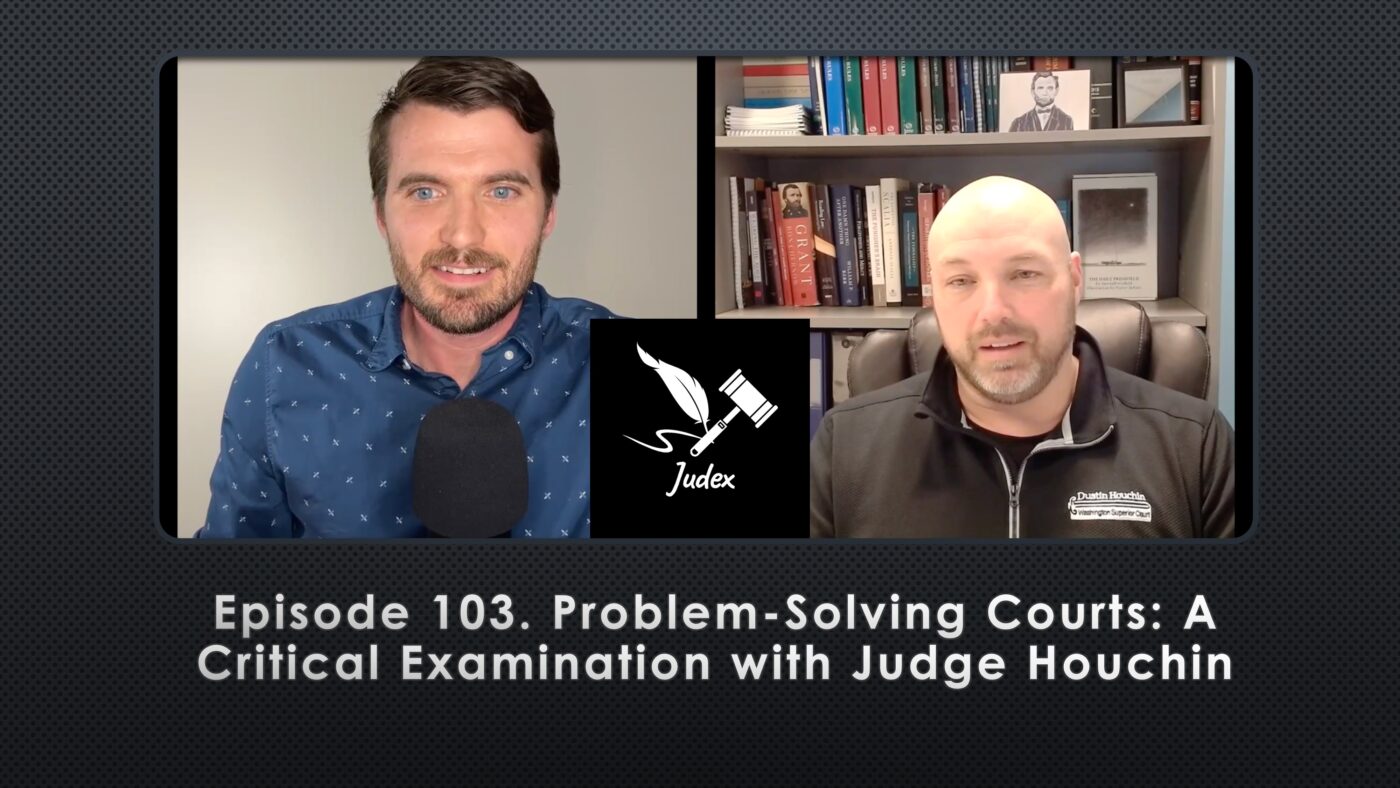Show Notes:
Episode 103. Problem-Solving Courts: A Critical Examination with Judge Houchin
In this episode, Judge Dustin Houchin discusses problem solving court. He highlights the lack of empirical evidence supporting the success of these courts and the methodological flaws in studies that claim otherwise. Judge Houchin also raises concerns about the separation of powers, as problem solving courts blur the lines between the judiciary and other branches of government. He argues that the judge’s role in these courts undermines their neutrality and detachment, leading to potential enabling behavior and a lack of accountability.
Additionally, he addresses the perverse incentives created by problem solving courts. This conversation explores the creation and motivations behind problem-solving courts, the financial incentives and job concerns involved, the influence of corporate interests, the violation of the separation of powers, and the alternative of retributive theory. The conversation highlights the lack of solid evidence supporting the efficacy of problem-solving courts and the potential dangers of their implementation.
Takeaways
- There is a lack of empirical evidence supporting the effectiveness of problem solving courts.
- Methodological flaws in studies on problem solving courts raise doubts about their validity.
- The creation of problem solving courts by the judiciary raises concerns about the separation of powers.
- The judge’s role in problem solving courts undermines their neutrality and detachment, potentially leading to enabling behavior and a lack of accountability.
- Problem solving courts can create perverse incentives and blur the lines between rehabilitation and punishment. Judges often engage in policy making and policing through the creation of problem-solving courts, stepping into the functions of both the legislative and executive branches.
- The motivations for judges to create problem-solving courts include personal satisfaction, political benefits, and prestige within the judicial system.
- Financial incentives and job concerns play a role in the maintenance and expansion of problem-solving courts, potentially leading to the manipulation of participant numbers and the imposition of unnecessary requirements.
- The compassion industrial complex, characterized by the intermingling of corporate interests and government programs, raises concerns about the motivations and biases behind problem-solving courts.
- The violation of the separation of powers is a significant issue when judges take on roles beyond their traditional function, leading to a lack of oversight and accountability.
- Retributive theory offers an alternative approach to addressing criminal behavior, focusing on punishment rather than rehabilitation within the judicial system.
- The Judex Substack provides further insights and discussions on these topics.
Chapters
00:00 Introduction of Judge Dustin Houchin
01:31 Problem Solving Courts and their Purpose
06:23 Different Perspectives on Drug Offenses
08:48 Effectiveness of Problem Solving Courts
10:37 Lack of Evidence for the Effectiveness of Problem Solving Courts
14:32 Methodological Problems in Studies on Problem Solving Courts
20:10 Creation and Implementation of Problem Solving Courts
22:59 Separation of Powers and Problem Solving Courts
26:37 Judicial Role in Problem Solving Courts
29:41 Enabling Behavior in Problem Solving Courts
32:12 Adversarial Process and Separation of Powers
34:38 Intrusion and Perverse Incentives in Problem Solving Courts
35:08 Judges’ Role in Policy Making and Policing
39:36 Judges’ Motivations for Creating Problem-Solving Courts
44:24 Financial Incentives and Job Concerns
47:12 Corporate Interests and Lack of Government Oversight
52:07 The Compassion Industrial Complex
56:29 Violation of Separation of Powers
59:19 Retributive Theory as an Alternative
01:01:59 Plug for Judex Substack
Resources:
Judex | Dustin Houchin | Substack
The Problem of Problem-Solving Courts by Erin Collins :: SSRN
https://papers.ssrn.com/sol3/papers.cfm?abstract_id=3492003
Problem-Solving Courts: Fighting Crime by Treating the Offender | National Institute of Justice
https://nij.ojp.gov/topics/articles/problem-solving-courts-fighting-crime-treating-offender
Episode 27. Crime and Punishment – A Retributive Theory of Justice with Judge Dustin Houchin – YouTube
https://www.youtube.com/watch?v=bJ3MIx-xcD4
Judex re Retributive Theory
Welcome to The Contender! – Erin Houchin
https://erinhouchin.substack.com/p/welcome-to-the-contender
The Contender with Erin Houchin | Podcast on Spotify
https://open.spotify.com/show/31fWKKIup2NxoQaJAqfzNJ
C.S. Lewis Quote
https://www.goodreads.com/quotes/526469-of-all-tyrannies-a-tyranny-sincerely-exercised-for-the-good
Federalist 51 (James Madison)
https://founders.archives.gov/documents/Madison/01-10-02-0279
Federalist 78 (Alexander Hamilton)
https://founders.archives.gov/documents/Hamilton/01-04-02-0241
Tags:
#liberty
#freedom
#courts
#justice
#law
#judge
#drugaddiction
#drugtreatment
#tyranny
#despotism
#problemsolvingcourts
#separationofpowers
DISCLAIMER: This podcast is for informational purposes only and should not be considered legal, medical, or financial advice. The views expressed in this podcast are those of the hosts and guests and do not necessarily reflect the views of any organizations or individuals they may mention. The hosts and guests are not liable for any damages that may result from someone listening to this podcast.

